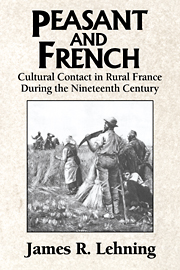Book contents
- Frontmatter
- Contents
- List of tables
- List of figures
- Acknowledgments
- 1 Introductory positions
- 2 The French nation and its peasants
- 3 The landscape in the early nineteenth century
- 4 Changes in the landscape
- 5 Gender, places, people
- 6 The ambiguities of schooling
- 7 Inside the parish church
- 8 A new site: electoral politics
- 9 Conclusion: toward a new rural history
- Sources and references
- Index
2 - The French nation and its peasants
Published online by Cambridge University Press: 23 September 2009
- Frontmatter
- Contents
- List of tables
- List of figures
- Acknowledgments
- 1 Introductory positions
- 2 The French nation and its peasants
- 3 The landscape in the early nineteenth century
- 4 Changes in the landscape
- 5 Gender, places, people
- 6 The ambiguities of schooling
- 7 Inside the parish church
- 8 A new site: electoral politics
- 9 Conclusion: toward a new rural history
- Sources and references
- Index
Summary
The question of membership arises continually in national histories. Imagining the French community has meant determining both who would be included in the nation and what form that inclusion would take, from the centralized monarchy to the gradual incorporation of “the people” into the nation during the nineteenth century, and the continued refusal of some parts of the French national territory, such as Brittany, to accept their place in the French nation. It has also meant a variety of ways of imagining the place of country dwellers in the nation. This national component of the history of French “peasants” has taken the form of different representations of country dwellers, constructions that can be found in multiple places in French national culture, describing the economic, social, political, and religious behaviors expected of “peasants.” There is no straightforward chronology of these constructions, for they were inherently unstable and contradictory, conceiving of country dwellers as a group apart from the nation, yet endowed with important national values. In subsequent chapters, as we take up different places of contact between French and rural cultures, we will need to consider the ways in which the French discourse about the countryside created these particular characteristics of the “peasant.” This chapter, however, will survey the stories that have been told about country dwellers in novels, histories, and visual representations.
- Type
- Chapter
- Information
- Peasant and FrenchCultural Contact in Rural France during the Nineteenth Century, pp. 11 - 34Publisher: Cambridge University PressPrint publication year: 1995



